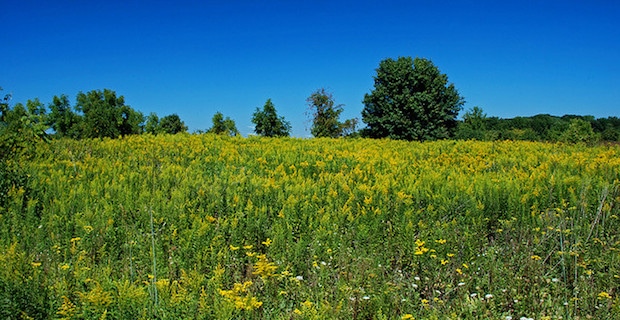
Sunny days are back at last! With warmer temperatures, everywhere you look the grass, trees and flowers are springing back to life. Everyone is aching to go outside to enjoy outdoor activities. Yet these activities can be a living nightmare for people with seasonal allergies. To make matters worse, the dreaded allergy seasons are now lasting longer, in part due to global warming.
Seasonal allergies are triggered by relatively harmless substances such as pollen and mold spores. Normally, our immune system does an amazing job of protecting us from harmful substances. With seasonal allergy suffers, their immune system is over-vigilant and even defends against harmless substances. The immune system does this by generating large amount of an antibody called immunoglobulin E (IgE). These antibodies attach to the surface of immune systems cells, mast cells (tissue cells) and basophils (blood cells) to trigger the release of defensive chemicals, such as histamines, which cause inflammation.
Read more about reversing chronic inflammation
The Signs & Symptoms of Seasonal Allergies
- Sneezing, often associated with runny or clogged nose
- Coughing with post-nasal drip (mucus build up in the back of nose and throat)
- Itchy, watery eyes
- Conjunctivitis
- Allergic shiners
- Allergic salute
When people who don't have seasonal allergies breathe in airborne allergens, the mucus in their nasal passages moves these particles to their throats where they are harmlessly swallowed or coughed out. However, for people who are sensitive to allergens, their immune system goes on high alert which causes itching, swelling, mucus production, hives, rashes, and for asthmatic individuals can trigger an asthma attack.
For many allergy sufferers going outdoors at this time of year is not an option. However, by making small changes to your daily routine you can enjoy outdoor activities even during the allergy season.
Routine Changes
- Don't go outside when pollen count is at its highest-which is in the morning-and keep your windows closed. Pollen count is directly affected by temperature, precipitation, humidity and wind conditions. The highest counts occur on warm, dry, and windy days and lowest on rainy, cloudy and windless days. Before venturing outside, find the levels of pollen in your area (by clicking here). This measures grains of pollen per square meter of air collected over a 24-hour period.
- Wear a face mask designed to filter pollen out of the air.
- Wear sunglasses outdoors to help minimize getting pollen in your eyes.
- Shower immediately after being outdoors to get rid of allergens stuck to clothes, skin and hair.
- Avoid exercising in places where pollen is concentrated, such as parks, and instead go to places with lower pollen counts, such as a beaches. Try to avoid areas with traffic congestion and air pollution.
- Keep an allergen-free home. Clean and change air filters (on your furnace, air conditioners, and air purifiers) regularly. Allowing your body to recover from the stress of allergies will help you better deal with them.
- Take a break and spend the day at the seashore or on a cruise where pollen count is low.
Seasonal allergies are commonly treated with antihistamine medications, nasal decongestant sprays or cortisone-based inhalers. These options are acceptable if you need immediate relief but by learning to manage your symptoms with natural alternatives, your wellness won't be dependent on a quick harsh-drug fix.
Natural Approaches
- Use a daily sinus rinse to remove and thin out secretions clogging your mucous membrane. (Click here, for a simple saline sinus rinse recipe.)
- Incorporate omega-3 fatty acids in your diet each and every day. Since omega-3s are anti-inflammatory, increasing your intake will help inhibit the inflammation linked to allergies and asthma.
- Quercetin, a naturally occurring bioflavonoid in foods-such as onions, apples, berries, tea, grapes and red wine–can help suppress inflammation by inhibiting release of histamine and other inflammatory mediators.
- Nettle (Urtica dioica) also known as stinging nettle, is a common plant quite effective for treating allergy symptoms. Nettle will help to alleviate inflammation caused by allergic reactions and clear congestion in your nose and chest.
- Curcumin, in the spice turmeric (Curcuma longa), has been shown to be an effective natural anti-inflammatory treatment for allergy sufferers.
- Acupuncture is a non-invasive, gentle option for elimination of allergies and allergy related conditions.
- Immunotherapy (an allergy shot) is another option that can also alleviate some of your allergic symptoms over the long term. After a few years of treatment, some people report significant allergy relief even after allergy shots are stopped.
It would be a shame to stay inside all season. Celebrate spring and summer and all they have to offer by helping your body react properly. Take the necessary precautions when you go outside and if the allergens are too high, plan an indoor activity for that day and have fun!
Image: Chad Horwedel










